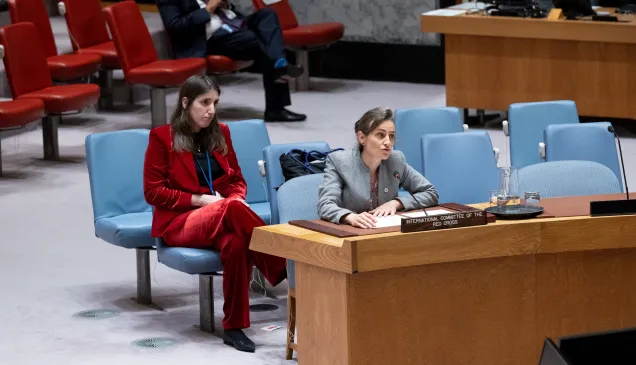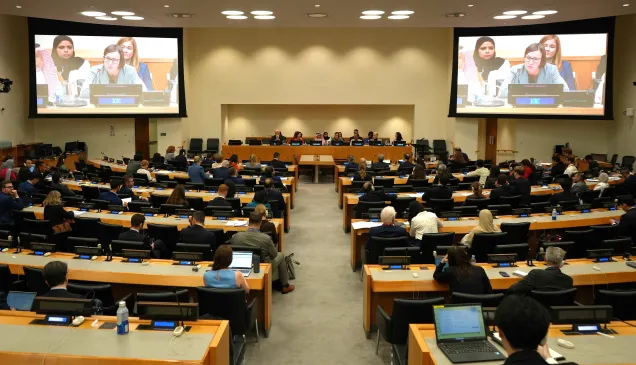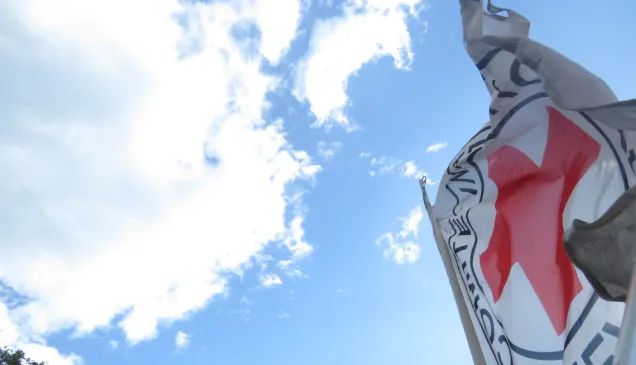ICRC’s response to missing and dead migrants along the US–Mexico border
Every year thousands of migrants go missing or lose their lives while migrating, including along the US–-Mexico border. This causes immense anguish for their families as they do not know what happened to them or where they are. The International Committee of the Red Cross (ICRC) works as a neutral and impartial humanitarian organization to help prevent the death, disappearance and other serious risks migrants face and ensure the dignified management of the deceased. We also work with the families of the missing to clarify the whereabouts of their loved ones.
To help explain our approach, below is a Q&A about our humanitarian work along the US–Mexico border and the broader Americas region.
-
While migratory patterns have fluctuated during the last 20 years, the last several years have witnessed record numbers of deaths on the US side of the border, particularly in Arizona and Texas.
We aim to promote a humanitarian approach to address the vulnerabilities of migrants, prevent disappearances, and loss of life. When people go missing or die in their journey, we insist that families are informed about the fate and whereabouts of their missing loved ones. We advocate for the dignity of the dead through proper management of human remains, including searching for and recovering remains, performing scientific forensic analysis, retaining traceability of the dead, identifying individuals, informing their loved ones and ensuring final disposition aligned with families’ funerary rituals.
As a neutral and impartial humanitarian organization, the ICRC does not take positions on political matters such as individual border policies. However, when border policies potentially contribute to increased risks for migrants, we share our observations or provide recommendations to address humanitarian concerns with authorities through our regular direct and confidential dialogue.
-
Around the world, ICRC forensic experts work in an advisory capacity or as a service provider to ensure that affected populations (i.e. the missing, deceased, and their families) are effectively protected by a well-functioning medicolegal system and forensic services.
In the United States, the medicolegal system is decentralized with each US state having its own system, authorities and jurisdiction, including those along the US–Mexico border. Our work generally seeks to improve the functionality and effectiveness of policies, processes and practices related to the dignity and protection of the dead, particularly in medicolegal jurisdictions that need support along the US–Mexico border.
The ICRC also works to strengthen local jurisdictions’ medicolegal capacities, improve accounting of migrant deaths, establish mechanisms to exchange information to identify migrants transnationally, improve coordination amongst all actors and provide advice for actors who work directly with families of missing migrants.
-
The ICRC advocates for a multidisciplinary approach to addressing the issue of missing and deceased migrants. Authorities are encouraged to better understand the nature of migrants’ deaths and disappearances in their jurisdictions (number of deaths, locations, causes, contributing factors, etc.), and to establish or scale up activities that prevent deaths (water stations, rescue beacons or operations, etc.). Authorities are also encouraged to develop mechanisms to centralize and manage information on deceased migrants within their jurisdictions and ensure effective and transparent communication mechanisms for families searching for their missing loved ones, including families located outside their jurisdictions.
The ICRC engages with US authorities at local, state, and federal levels to provide feedback on current procedures or processes and offer its advice, guidance, and recommendations to improve the search for the missing and protection of the dead. The ICRC also encourages authorities to develop formalized information exchange mechanisms across borders to facilitate identification of missing migrants. Increasing the number of forensic identifications, as well as retaining traceability of the bodies of unidentified or unclaimed deceased persons, is a major challenge but critical for families searching for a missing loved one.
When migrants die during transit to or within the US, authorities should properly manage the dead, including searching for, recovering, analysing and identifying the person, and notifying families in a timely, transparent and compassionate manner. Forensic sciences play an important role; the institutions involved in the handling of unidentified deceased persons should be strengthened and provided with the necessary means to conduct their work.
-
As our approach to migration is strictly humanitarian, we provide information about ways to reduce risk and where migrants can find life-saving assistance for their own safety while on the move. This information is essential for preventing the loss of lives.
The ICRC, as a part of the International Red Cross and Red Crescent Movement, does not prevent nor does it encourage migration. Our priority is to save lives and keep people safe by mitigating the humanitarian consequences that migration can bring – including separation and loss of family contacts, disappearances, serious medical issues, and even death.
Access to information reduces the risks and mitigates the humanitarian consequences that migrants face, particularly the most vulnerable. Knowing how to locate life-saving resources can make a significant difference to a migrant and their families.
We consult with not only the National Societies in each country, but also the authorities and the migrants, themselves, to reduce the factors that contribute to their vulnerability and keep people safe.
-
The ICRC, along with National Red Cross Society partners, works on the basis that the person has already decided to leave. Our aim is to help mitigate the humanitarian consequences that migration can bring – including separation and loss of family contacts, disappearance, lack of access to essential services (e.g. medical care), and death. We do this by providing a humanitarian response to specific needs of this particularly vulnerable population and engaging with the relevant authorities on issues concerning their international obligations for the dignified treatment of migrants in all circumstances.
We work together with the National Societies in the region to respond to the most urgent humanitarian needs of migrants by providing medical services, ranging from community health and first aid, to assisting migrants with disabilities, and providing psychosocial support and other health services according to need. These activities are exclusively humanitarian and not intended to prevent, reduce or encourage migration.
-
As the world’s largest humanitarian network, Red Cross and Red Crescent teams help reconnect families separated by migration.
To begin a search, or to have information on which authority to contact, please contact the nearest Red Cross or Red Crescent office in the country you’re currently living in.
Increasing the number of forensic identifications, as well as retaining traceability of the bodies of unidentified or unclaimed deceased persons, is a major challenge but critical for families searching for a missing loved one.
Cate Bird, ICRC forensics adviser for the US and Canada regional delegation



